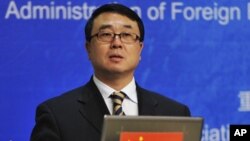The U.S. State Department has confirmed a New York Times report claiming that a former Chongqing police chief connected to disgraced political leader Bo Xilai visited the U.S. Consulate earlier this year.
U.S. State Department spokesman Mark Toner confirmed Wang Lijun, who served as Chongqing vice mayor and police chief under Bo, visited the U.S. Consulate in Chengdu in February.
However, Toner would not confirm whether political asylum was discussed or other details of the visit, saying only that Wang left the consulate on his own shortly after and that U.S. officials have not been in contact with him since.
|
Timeline of Bo Xilai Scandal |
|
Late Tuesday, The New York Times reported inside details of Wang's brief stay at the U.S. Consulate in Chengdu. The report said U.S. officials in China held him under their protection for 36 hours so he could be handed over to Beijing authorities rather than local police.
Using unnamed administration officials, congressional aides and diplomats, the report says Wang arrived at the consulate February 6 in "an agitated state," setting off a "frantic debate" among U.S. officials that reached into the White House.
The Times says the handling of the case was decided by the State Department, which quickly rejected Wang's request for asylum because of his unsavory reputation and the difficulty of spiriting him out of China. But the officials allowed Wang to remain in the consulate while he arranged safe passage to Beijing, rather than deliver him to local police officers loyal to Bo.
Nothing further has been reported about Wang's fate, but Chinese leaders replaced Bo as Chongqing's political chief shortly after Wang's arrival in the capital.
The newspaper says Wang arrived at the consulate carrying documents detailing charges against Bo and his wife, Gu Kailai, who is being investigated in connection with the suspected murder of a British businessman. Bo has since been removed from all his posts as a top Communist Party official on charges of breaching party discipline.
The Times says Wang did not hand over the documents he was carrying, but that he did provide consulate officials a "rambling but ultimately revealing discourse on the murky intersection of power, politics and corruption" in China.
Under Bo's direction, Wang had conducted a wide-ranging crackdown on crime in the sprawling megacity of Chongqing, prompting complaints that many of the arrests were based on limited evidence.
British businessman Neil Heywood had been engaged in business dealings with Gu before his death, which is suspected of having been caused by poisoning.




